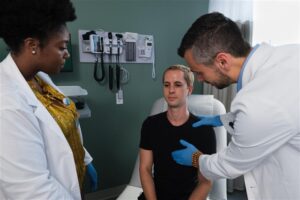Remove Harmful Pesticides From Kenya- Over 12,000 Kenyans Urge the Government

Over 12,000 Kenyans have demanded the removal of toxic pesticides in the country by signing a public petition, No More Poison In Our Food, by Greenpeace Africa and submitted to the Uasin Gishu Woman Representative, Hon Gladys Boss Shollei.
These signatures are in support of the parliamentary petition tabled by Hon. Shollei in 2019 with regards to withdrawing harmful chemical pesticides from the Kenyan market.
Hon. Shollei represented four civil society organisations through her action namely, the Biodiversity and Biosafety Association of Kenya (BIBA-K), Kenya Organic Agriculture Network (KOAN), Resources Oriented Development Initiatives (RODI) and the Route to Food Initiative (RTFI).
Kenya’s food has been exposed to harmful agricultural chemicals posing a grave danger to the public health of Kenyans and the environment.

The Kenyan Parliament, through the Departmental Committee on Health echoed concerns over the high level of pesticide residues in fruits and vegetables, in their official report.
Amongst other things, the committee recommended that the Ministry of Agriculture, through the Pest Control Products Board (PCPB) undertake an analysis of all active ingredients registered for use in Kenya, with the view to withdrawing hazardous – or potentially hazardous – pesticides.
Hon. Gladys Boss Shollei stated, “It is a tragedy that American and European
companies continue to manufacture and export pesticides that are banned in their own countries. The African pesticide market remains small and only accounts for 2-4% of the global usage. That means our farmers, right here in Kenya, are the next big market for the sale of toxic pesticides. I have taken the responsibility as a legislator, to address this double standard and strengthen our regulatory framework to protect our farmer sovereignty and ecosystems”.

Greenpeace Africa reiterates its position that the food system in Kenya must be
urgently protected for the sake of the health of Kenyans and for the environment.
“Dangerous chemicals such as Chlorpyrifos that have been proven to cause
neurodevelopment problems and impaired brain function in children are still used in Kenya to produce food. Additionally, some of these chemicals have been proven to contaminate the soil and water rendering them unsafe for human use.
Our environment, health and future generations are therefore at stake. The Kenyan government needs to act with urgency to protect Kenyans from the impacts of these detrimental chemicals,” said Greenpeace campaigner Claire Nasike.
The toxic pesticides are not limited to food production but also in the control of pests such as locusts. In March this year, Greenpeace Africa carried out an environmental assessment of the pesticides that were used in locust control and the results showed Deltamethrin – a pesticide capable of causing harm to the human nervous system and also toxic to bees and fish – was used to control the locust invasion in Nakuru, Kenya.
“It is possible to farm without toxic pesticides by incorporating agroecological practices and integrated pest management and still produce enough food while at the same time protecting the environment. All players in the food system starting with producers and consumers, policymakers and market actors need to work towards a more transparent, equitable and sustainable food system. As the Route to Food Initiative, we continue to champion food and farming systems that avoid the risks associated with exposure to toxic pesticides. We also join hands with the growing number of people in Kenya supporting the agroecological transformation of the food system to not only ensure the safety of the food produced but also enhance affordability, nutritional quality and sustainable livelihoods for producers’’ added Emmanuel
Atamba, Researcher and Policy Analyst at the RTFI.
Esther Bett, the Executive Director of RODI, also stated, “evidence has exposed the harmful effects of pesticides to people and the environment and it is time Kenyans who produce food were immersed in alternative strategies to pest control.
There is a need for farmers and consumers to take bold decisions and demand for the government to safeguard our food and farming systems’’.

Greenpeace Africa, Claire Nasike, concluded that “by consolidating signatures from the public with an aim of submission to the National Assembly through Hon. GladysBoss Shollei, we are calling upon Hon. Peter Munya, the Cabinet Secretary, Ministry of Agriculture, Livestock, Fisheries and Cooperatives and Pest Control Products Board to undertake their review of pesticides with urgency and immediate action with regards to active ingredients that have undisputed harmful consequences.” Safeguarding human lives and the critical biodiversity upon which our farmers and food productiondepend, should be the first and foremost priority on our political agenda.





